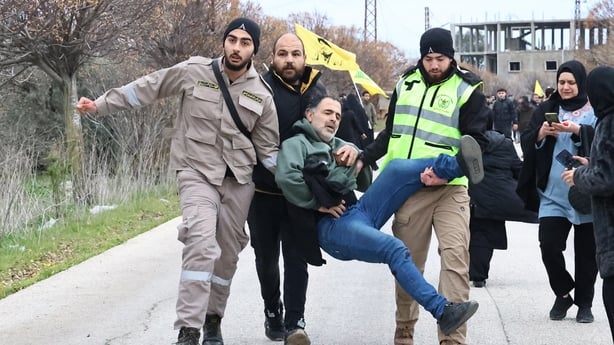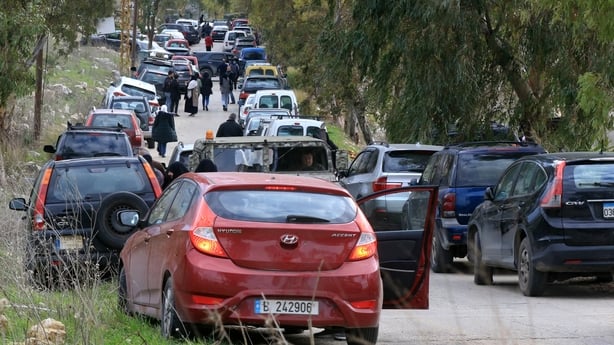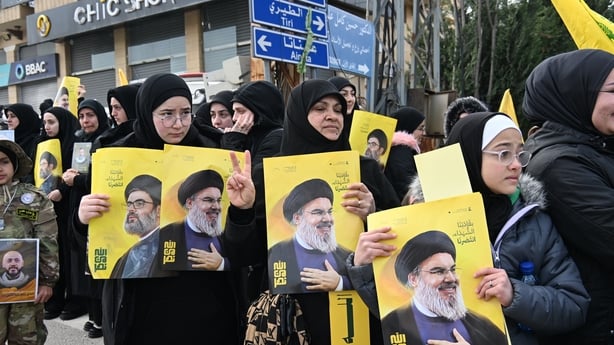Israeli troops killed 22 people in south Lebanon as a deadline for their withdrawal passed and thousands of people tried to return to their homes in defiance of an Israeli military demand, Lebanese authorities said.
Lebanon's health ministry said that Israeli forces opened fire on "citizens who were trying to return to their villages that are still under (Israeli) occupation".
The death toll included six women and a soldier and 124 other people were wounded. The Lebanese army also announced the soldier's death and said another had been wounded.
Israel said on Friday it would keep troops in the south beyond today's deadline set out in a US-brokered ceasefire that halted last year's war with Hezbollah, claiming Lebanon had not yet fully enforced terms requiring south Lebanon to be free of Hezbollah arms and the Lebanese army to be deployed.
Lebanon's US-backed military, which reported one of its soldiers among those killed by Israeli forces, has accused Israel of procrastinating in its withdrawal.
The Hezbollah-Israel conflict was fought in parallel with Israel’s war in Gaza and peaked in a major Israeli invasion that uprooted more than a million people in Lebanon and left the Hezbollah movement badly weakened.

The Israeli military claimed that its troops "operating in southern Lebanon fired warning shots to remove threats in a number of areas where suspects were identified approaching the troops".
It also claimed that "a number of suspects ... that posed an imminent threat" were apprehended.
Hezbollah's al-Manar television, broadcasting from several locations in the south, showed footage of residents moving towards villages, some holding the group's flag and images of Hezbollah fighters killed in the war.
"We will return to our villages and the Israeli enemy will leave," even if it costs lives, said Ali Harb, a 27-year-old trying to go to Kfar Kila.

An Israeli military spokesperson, addressing the people of south Lebanon in a post on X, formerly Twitter accused Hezbollah of trying to "heat up the situation" and claimed the Israeli army would "in the near future" inform them of places to which they can return.
Hezbollah has put the onus on the Lebanese state to ensure Israel's withdrawal.
Hezbollah politician Hassan Fadlallah said Lebanon is committed to the ceasefire deal, but that Israel had turned against it with US support.
The White House claimed on Friday that a short, temporary ceasefire extension was urgently needed.
President urges southerners to trust army
"What is happening in the border villages is a liberation by the power of the people, and our people will not be broken by the Israeli army," President Joseph Aoun told Reuters.
"We want the state to play its full role, and the army to be deployed in the villages.
President Aoun added: "We cooperate with it to facilitate its mission."
The top UN official in Lebanon and the head of the UN peacekeepers in the south said conditions were "not yet in place" for the safe return of Lebanese citizens to villages near the border.
"The fact is that the timelines envisaged" in the ceasefire "have not been met", they said in a statement.

The agreement set out a 60-day timeline for implementation.
President Aoun, Lebanon's army commander until parliament elected him head of state on 9 January, called on the people of the south to exercise self-restraint and trust in the Lebanese military.
"Lebanon's sovereignty and territorial integrity are non-negotiable, and I am following up on this issue at the highest levels to ensure your rights and dignity," he said in a statement.
Israel has not said how long its forces would remain in the south, where the Israeli military claims it has been seizing Hezbollah weapons and dismantling its infrastructure.
Israel said its offensive against Hezbollah aimed to secure the return home of tens of thousands of Israelis who were forced to leave homes at the border by Hezbollah rocket fire.
Hezbollah opened fire in support of its Palestinian ally Hamas at the start of the Gaza war on 8 October 2023.

